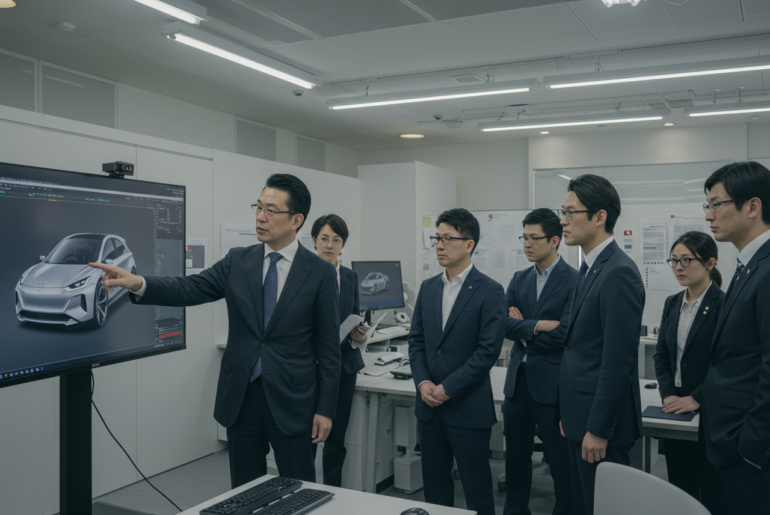This article may contain references to products or services from one or more of our advertisers or partners. We may receive compensation when you click on links to those products or services. Nonetheless, our opinions are our own.
The information presented in this article is accurate to the best of our knowledge at the time of publication. However, information is subject to change, and no guarantees are made about the continued accuracy or completeness of this content after its publication date.
As you navigate the complexities of the global automotive market, you might find yourself intrigued by the escalating tensions between the United States and its trade partners, notably in international trade policies. Recently, a prominent Japanese carmaker has found itself at a crossroads, compelled to take drastic measures in response to the ongoing U.S. trade war. This situation highlights the intricate web of economic relationships and sheds light on how manufacturers adapt to protect their interests. We will search into the actions taken by this distinguished automaker, exploring the implications for both the company and the broader industry, and how such decisions may influence your perceptions of the automotive landscape as it evolves amidst international challenges.
- Understanding the Impact of the Trade War on Japanese Automakers
- Exploring Strategic Shifts in Manufacturing and Supply Chains
- What This Means for American Consumers and Car Buyers
- Analyzing the Financial Implications for Investors in the Automotive Sector
- Practical Steps You Can Take to Navigate the Changing Market Landscape
- Empowering Your Financial Decisions Amid Industry Uncertainty
- Conclusion
- Frequently Asked Questions
- Recommended Reads
Understanding the Impact of the Trade War on Japanese Automakers
The ongoing trade war has prompted Japanese automakers to significantly reevaluate their strategies. As tariffs on both sides escalate, these companies are faced with a shifting landscape that impacts their production costs, pricing strategies, and overall competitiveness. You may notice that manufacturers are now focusing on localizing production to mitigate the financial burden of tariffs, which means shifting some operations to the U.S. to avoid heavy taxation on imported vehicles. This strategic move helps them save on costs and aligns them better with local market demands.
Moreover, the trade war has intensified the urgency of innovation within these firms. It’s vital to adapt to changing market conditions, leading to:
- Increased Investment in Electric Vehicles (EVs): Companies are pivoting towards greener technologies to meet evolving consumer preferences and regulatory demands.
- Strengthened Supply Chains: Automakers are diversifying their suppliers to reduce risks associated with geopolitical tensions.
- Enhanced consumer Engagement: There is more emphasis on marketing to educate potential buyers about the value and quality of Japanese vehicles.
| Action Taken | Reason |
|---|---|
| Local Manufacturing Expansion | to avoid tariffs and meet local demand |
| Investment in R&D for EVs | Align with global sustainability trends |
| Diverse Supplier Networks | Mitigate risk from trade tensions |
These shifts reflect a reaction to current circumstances and a proactive approach to ensure resilience amidst uncertainty. Observing these changes can offer you insight into how the broader automotive market adapts, positioning you to make informed decisions,whether you’re considering a new car purchase or investing in automotive stocks.
Exploring Strategic Shifts in Manufacturing and Supply Chains
To navigate the turbulent waters of the current trade landscape, Japanese carmakers are reshaping their manufacturing and supply chain strategies with remarkable agility. These shifts represent not merely a reaction to external pressures but a strategic realignment to foster resilience and adapt to consumer demands. You may find it fascinating how automakers are embracing a range of tactics to stay ahead:
- Localized Production: Many companies are increasing their domestic manufacturing capabilities to reduce reliance on overseas suppliers, mitigating risks associated with tariffs and trade disputes.
- Diversified Sourcing: By sourcing components from a wider array of countries, they can bypass potential trade barriers and maintain a steady flow of necessary materials.
- Investment in Technology: Automation and innovative manufacturing technologies are being prioritized to enhance productivity and reduce costs in the long run.
To put this into perspective, consider the following table illustrating recent strategic moves by leading Japanese carmakers:
| Company | Strategy | Impact |
|---|---|---|
| toyota | Increased U.S. production | Improved market responsiveness |
| Nissan | Partnerships for local sourcing | Lowered import costs |
| Honda | adoption of robotics | Enhanced production efficiency |
These adjustments bolster the carmakers’ standing in the face of fluctuating trade policies and demonstrate a proactive approach that you can learn from when considering your own financial strategies amidst uncertainty. By focusing on resiliency and flexibility—whether in business or personal finance—you can effectively withstand the winds of change.
What This Means for American Consumers and Car Buyers
The recent moves by Japanese automakers in response to the escalating trade tensions are likely to ripple through the U.S. market, presenting both challenges and opportunities for you as a consumer and car buyer. As manufacturers scramble to cope with tariffs and supply chain disruptions, you could see several potential changes in the landscape:
- Increased Prices: With tariffs perhaps driving up costs, new vehicles from Japanese brands may come with heftier price tags. This could urge you to consider used options or alternative brands that may not be as affected by these trade dynamics.
- Supply Constraints: If production slows due to increased operational costs or shifts in sourcing, the availability of specific models may dwindle. This means you might need to act faster when finding the right vehicle.
- Enhanced Features: To maintain competitiveness, manufacturers may invest in technology and features that appeal to you, potentially leading to better vehicle safety and entertainment options.
Ultimately, being informed and aware of these market shifts will empower you to make smarter buying decisions. Keeping an eye on the evolving situation could help you negotiate better deals or find optimal financing options to fit your budget.
Voted "Best Overall Budgeting App" by Forbes and WSJ
Monarch Money helps you budget, track spending, set goals, and plan your financial future—all in one app.
Get 50% OFF your first year with code MONARCHVIP
Analyzing the Financial Implications for Investors in the Automotive Sector
As an investor in the automotive sector, staying abreast of the shifting dynamics caused by geopolitical events like the ongoing U.S. trade war is essential. Japanese automakers,typically viewed as resilient players,are now forced to adopt new strategies that could influence their stock performance and your investment decisions.Here are some factors to consider:
- Cost Adjustments: Automakers are revising their production costs, often opting for cheaper raw materials or relocating operations to minimize tariffs. This can impact profit margins and, ultimately, stock prices.
- Market Share Strategy: In response to changing trade policies, companies may pivot to focus more on domestic markets or diversify their supply chains. Monitoring these shifts can offer insight into potential growth trajectories.
- Investment in Technology: The push for electric vehicles (EVs) and automation is intensifying. Companies that strategically invest in these technologies could outperform their competitors, presenting lucrative opportunities for you.
| Key Factors | Potential Impact |
|---|---|
| Tariffs on Imported Goods | Increased costs could lead to higher retail prices, affecting sales. |
| Global supply Chain Adjustments | New partnerships may lead to more stable production processes. |
| R&D for EVs | Long-term profitability might be enhanced through innovation in lasting technologies. |
Ultimately, while the trade war presents challenges, it offers unique opportunities for discerning investors. By analyzing these financial implications and staying proactive, you can position your investment portfolio for success in a rapidly evolving automotive landscape.
As you navigate the turbulent waters of the U.S. trade war, adopting a proactive approach is crucial. Here are some practical steps you can take:
- Stay Informed: Keep up-to-date with trade policies and market trends that may impact the automotive industry. Regularly check reliable news sources for updates.
- Diversify Your Investments: If you hold stocks in companies heavily affected by the trade war, consider diversifying your portfolio to mitigate risks. Explore opportunities in sectors that are less impacted.
- Evaluate Your Purchases: If you’re in the market for a new vehicle, consider the implications of tariffs. Analyze whether buying domestically or from foreign manufacturers makes more financial sense for you right now.
- Strengthen Your Emergency Fund: Economic uncertainties call for a robust emergency fund. Aim to have at least three to six months of living expenses saved to cushion against any unforeseen financial impacts.
In addition, it might be helpful to assess your current financial situation through a simple budgeting table:
| Category | Budgeted Amount | Actual amount | Difference |
|---|---|---|---|
| Income | $4,000 | $4,000 | $0 |
| Expenses | $2,500 | $2,800 | -$300 |
| Savings | $1,500 | $1,200 | -$300 |
By regularly tracking your income and expenses, you can make adjustments more effortlessly and stay ahead of any economic challenges the changing market landscape poses.
Empowering Your Financial Decisions Amid Industry Uncertainty
In times of volatility, such as the current trade war dynamics impacting the automotive industry, taking a proactive approach to your financial decisions is essential. When major companies like Japanese automakers adjust their strategies, it’s not just a corporate concern; it affects consumers, suppliers, and investors alike. Here are some points to consider:
- Stay Informed: Follow news related to trade policies and their implications. Understanding how these changes can affect prices and availability of products helps you plan your purchases wisely.
- Adjust Your Budget: Consider revising your spending plan with price increases on imported goods. Setting aside additional funds for automotive services or repairs can relieve financial stress.
- Diversification Matters: Even if you’re not an investor in the automotive sector, consider broadening your financial portfolio. This could involve incorporating different industries that might be less affected by trade tensions.
It may also be helpful to assess your current vehicle’s needs. If you’ve been considering buying a new car, evaluate:
| Current Situation | Potential Actions |
|---|---|
| Needing a reliable vehicle | Research alternatives or wait for potential markdowns. |
| Current car effectively meets needs | Hold off on a significant purchase; maintain your vehicle and save. |
By staying informed and being strategic about your choices, you can navigate these uncertain times and remain confident in your financial decisions.
Conclusion
The ongoing U.S. trade war has reshaped the global automotive landscape, especially for Japanese carmakers. In response to increasing tariffs and trade tensions, these companies are making bold moves to protect their financial interests and maintain their competitive edge. From shifting production closer to the U.S. market to investing heavily in electric vehicle technologies, automakers are adapting to an ever-evolving global marketplace.
For consumers, these changes may mean higher vehicle prices, supply chain disruptions, or new product offerings with advanced features. However, these shifts also present opportunities—whether in smarter buying decisions or investment strategies that capitalize on innovation and market resilience.
Staying informed and flexible will be key as you navigate this dynamic environment. Whether considering a vehicle purchase, tracking market trends, or managing your investment portfolio, understanding the broader economic forces will help you make better financial decisions. The automotive industry is a prime example of how global trade affects local markets, and how businesses and individuals alike can adapt to uncertain times.
By embracing strategic financial planning and remaining agile, you can navigate the complexities of the automotive market and other sectors impacted by international trade.
Frequently Asked Questions
What drastic actions is the Japanese carmaker taking in response to the U.S. trade war?
The carmaker is shifting parts of its production process to facilities outside of the U.S. to mitigate the impact of increased tariffs on imported goods. This includes expanding operations in countries like Mexico and Canada.
Why is the U.S. trade war particularly impactful for this carmaker?
The carmaker relies heavily on exports to the U.S. market for a notable portion of its sales. Tariffs and trade tensions can increase costs and disrupt supply chains, threatening profitability and competitiveness.
How is the carmaker planning to adapt its supply chain?
To adapt, the carmaker is investing in new manufacturing facilities abroad and securing local suppliers to reduce import dependence. This move aims to streamline operations and reduce costs associated with tariffs.
What are the potential long-term effects of these changes?
The changes could lead to a more diversified production strategy, reducing risk exposure. However, it may also impact jobs and economic activity in regions tied to current manufacturing plants, leading to community and workforce challenges.

Reviewed and edited by Albert Fang.
See a typo or want to suggest an edit/revision to the content? Use the contact us form to provide feedback.
At FangWallet, we value editorial integrity and open collaboration in curating quality content for readers to enjoy. Much appreciated for the assist.
Did you like our article and find it insightful? We encourage sharing the article link with family and friends to benefit as well - better yet, sharing on social media. Thank you for the support! 🍉
Article Title: How Japanese Automakers Are Adapting to the U.S. Trade War
https://fangwallet.com/2025/04/15/japanese-automakers/The FangWallet Promise
FangWallet is an editorially independent resource - founded on breaking down challenging financial concepts for anyone to understand since 2014. While we adhere to editorial integrity, note that this post may contain references to products from our partners.
The FangWallet promise is always to have your best interest in mind and be transparent and honest about the financial picture.
Become an Insider

Subscribe to get a free daily budget planner printable to help get your money on track!
Make passive money the right way. No spam.
Editorial Disclaimer: The editorial content on this page is not provided by any of the companies mentioned. The opinions expressed here are the author's alone.
The content of this website is for informational purposes only and does not represent investment advice, or an offer or solicitation to buy or sell any security, investment, or product. Investors are encouraged to do their own due diligence, and, if necessary, consult professional advising before making any investment decisions. Investing involves a high degree of risk, and financial losses may occur including the potential loss of principal.
Source Citation References:
+ Inspo
There are no additional citations or references to note for this article at this time.












































